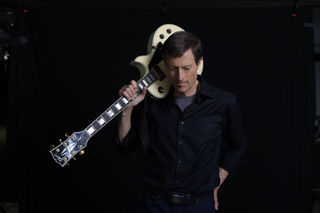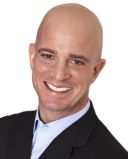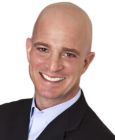Career
The Chaos of Neal Barnard
Plant-based pioneer shares career in medicine and music
Posted March 7, 2017
“There’s a time nearer the end;
The colors are all too slow to fade;
And yet I’ll hold you fast in my heart;
No one will ever take you away;
From “Louder Than Words” by CarbonWorks
Neal Barnard has never been one to accept the status quo.
As a child growing up in North Dakota, Barnard learned to play classical music on the piano and cello.
Then he heard the Beatles.

“The Beatles were rebellious. Our parents hated them. And my mom would say, ‘I can see they’re good writers but they scream all the time,’” Barnard explained. “It was a time of such a monumental societal change. And music was a way for one generation to rebel against the values of another generation. Wrapped up in it were many things including civil rights and the anti-war movement.”
“Suddenly my black and white world turned to color.”
But soon even the Beatles seemed like old hat to Barnard. “Within a couple of years I saw the Beatles as being too tame. And I wanted something that was more vigorous and more exciting,” Barnard recalled. “And so I listened to Jack Bruce and Ginger Baker and Eric Clapton in Cream and to Hendrix. And I thought, I got that – let’s go further. John McLaughlin was a big influence on me.
“You can always look for something that is new and fresh and exciting and fun.”
Eventually, Barnard began playing in his own bands, and in the early 1980’s found his way into the Washington D.C. music scene. This was at a time when several Washington D.C. bands such as Bad Brains, Minor Threat, and the Urban Verbs were taking punk rock in all sorts of new and exciting directions.
And Barnard’s band Pop Maru fit in perfectly with the innovative scene, mixing post-punk, no wave and avant garde jazz sensibilities into an eclectic mix. “Ours was on the line between New Wave and punk. I thought of it as industrial new wave. I was thinking of Talking Heads and Lori Anderson and Lou Reed,” he said.
In fact, Pop Maru was so innovative that according to Barnard, even their record company, Wasp Records, didn’t know how to describe them. “When our record came out, the record company sent out a press release that said, ‘We realize that Pop Maru is a difficult and somewhat inaccessible act for some stations to program extensively; it makes it a tough introduction for us … ‘”
“To which I thought, well, that’s really putting your best foot forward, isn’t it?”
Barnard eventually went on to play in the band Verdun, where he found a new way to make his music more creative – he included singers who spoke different languages such as Vietnamese and French. “People said, ‘What are you? Are you a rock band? Are you a jazz band? Are you a world music band?’ We didn’t fit in any bin at the record store.”
The critics didn’t mind, and they appreciated Barnard’s experimental style on
Verdun’s eponymous album. For example, Verdun was described by Portfolio Weekly as “… one of the most innovative and intriguing records I’ve ever heard.” NewAgeReporter.com concurred, saying “Verdun is one of those rare records that’s undefinable…a cohesive and strikingly beautiful record.”
So all things being equal, Barnard’s musical career was in full swing.
Except for one thing – Barnard wasn’t an aspiring professional musician, he was a doctor. And he was not necessarily keen on integrating his two worlds.
“If you’re a musician, it’s not going to help your medical career very much. But it’s even worse the other way,” Barnard described. “There used to be a jazz-playing dentist. And I thought, my God, kill me. What a way to communicate to people that you have music definitely not worth listening to. I realized that I would have had much more credibility as a musician if I had just gotten out of prison, had a face tattoo, was in and out of rehab, and had assaulted a few people.”
Yet despite his best intentions, his worlds did collide. Barnard describes one incident in which a patient arrived while Pop Maru was getting ready to play a show at Washington D.C.’s 9:30 club.
“At the time, I was working at the psychiatric ward in GW Hospital. One patient had a serious eating disorder. She was allowed to go home on the weekend, but she’d have to come back in on Monday morning. So one Saturday night, I was in the dressing room at the 9:30 Club, getting ready to go on stage, and in walked my patient,” Barnard recalled. “She looked at me and couldn’t believe it. Here was her doctor at the 9:30 Club with a guitar. I said hi, but she just left. Monday morning I arrived at the hospital and one of the attending physicians grabbed me and said, ‘Neal, we have a serious problem…your patient is de-compensating rapidly, we need to start her on medication right away. She’s now hallucinating. She thinks she saw you performing at the 9:30 Club in a punk band.’”
But there was no way Barnard was giving up medicine. In fact, he was charting out a path for himself in medicine that was perhaps even more confrontational and innovative than his music. In 1985, Barnard founded the Physician’s Committee for Responsible Medicine, which proposed that medicine should focus on preventing disease rather than just treating it.
“My career has been as unclassifiable as the music. When I went to medical school, all I was interested in was the brain. I wasn’t drawn to the rest of it initially. I was only interested in how the brain works and how things go wrong,” he explained. “So I’m a board-certified psychiatrist. But as time has gone on, I’ve gotten involved in research on diabetes and metabolic problems. So I’m now in GW’s Department of Internal Medicine, and in 2015, I became a fellow of the American College of Cardiology. It’s been a bit of a journey, but it all works together.
“Along the way, I became convinced that in medicine we don’t do nearly enough to prevent illness. We wait until a heart attack comes through the emergency room door. So I set up the Physician’s Committee for Responsible Medicine because I wanted doctors to emphasize preventive medicine and nutrition and good health, rather than just waiting for people to get sick.”
Barnard became convinced that a critical path to health is through a plant-based diet. And his research -- funded by the National Institute of Health -- has shown that a low-fat vegan diet is efficacious in reducing weight and plasma lipid reductions, as well as improved glycemia in individuals with type 2 diabetes. Barnard also became an advocate for animal rights and touts the environmental benefits of reduced consumption of meat.
“When I was in college, we experimented on animals to study brain function. Over time, I became convinced that our experiments were cruel and unnecessary, and that we could pursue research in more ethical ways. These were all controversies, of course, and I felt that the best way to deal with it was to bring the power of medical authority to bear,” Barnard explained. “And, of course, when people get the animals off their plates and eat as healthfully as they can, it’s good for their own health, it’s good for the animals, and it’s good for the environment.
“And hopefully people will take other steps for their health and other steps to be stewards of the world they’re in.”
Convincing the world of the benefits of a plant-based diet has been by no means easy. Even the American Medical Association initially took issue with Barnard speaking out against animal experimentation and consumption of animal products. The AMA eventually relented, and today, Barnard is an active AMA member, encouraging the organization to take a progressive stance on nutrition and health. It has been a slow, steady process.
Barnard feels that to a large degree, culture has dictated people’s comfort with consuming animal products.
“I don’t believe that logic dictates most of human behavior. Whatever your parents ate is probably what you’re going to eat as well, because it feels right to you. Doctors may speak of the health risks of meat, for example, but if we grew up with it, we assume it must be okay. We don’t really think about it,” he explained.
He points to a more nefarious example of the effect of culture. “Psychoanalyst Robert J. Lifton wrote a brilliant book called The Nazi Doctors, based on his interviews with physicians who had committed hideous war crimes. And Lifton’s conclusion was devastating. He found that these doctors were simply normal people in a culture that made it seemingly appropriate to do things we cannot imagine today.”
“So in a more mundane example, if it’s culturally appropriate to smoke, eat a pork chop, or do other unhealthy things, people will follow cultural norms, and pass them along to their children.”
Despite the pushback, Barnard is more determined than ever to pursue his music and his work to reform the world of medicine. “I am eternally an optimist—or at least determined. It’s easy to lose hope when you look around and see the shape the world is in,” Barnard explained. “And now’s a time when many people are feeling that way. But the answer is to work hard and try to be as creative as you can and see where things can go.”
To that end, Barnard’s new book The Cheese Trap is taking on a sacred cow (I couldn’t resist) – people’s beloved cheese, which Barnard feels is not only unhealthful—loaded with fat, cholesterol, sodium, and calories—but is also essentially addictive. Barnard described how years of working with people on a plant-based diet made him aware of some people’s reluctance to give up cheese.
“Many people would say the one thing they really missed was cheese. Not ice cream, not meat, not milk. It was specifically cheese,” Barnard explained. “And they would talk about it like a drug,” Barnard said. So I began to look into it. And evidence suggests that it is a major contributor to weight gain and a range of other problems, and that it does indeed affect the brain in ways that make it habit-forming. An average American puts away 60,000 calories’ worth of it every single year.
Just like everything else that he does, Barnard is already rattling cages with The Cheese Trap. The New York Times wrote, “by the end of the book I was sufficiently freaked out to go and buy something calling itself paleo mozzarella-style cheese. It is vegan, and it tastes like tapioca flavored with coconut. Not bad!”
And Barnard may be finally ready to merge his two worlds. In his new band, CarbonWorks and their self-titled 2016 record, he combines musicians from several genres of music, including Italian singer Naif Hérin and blues musician Chris Thomas King. In the band’s new song and video, “Louder Than Words,” Barnard takes on the issue of animal cruelty with a visceral video that may make it hard for people to be unkind to animals again.
But wherever his careers in music and medicine take him, Barnard will keep pushing things to the limit. He recalled a story of his work with Bernie Grundman who mastered the new CarbonWorks album.
“We were working on a long and complex song called ‘The End,’ which is hard-driving jazz played simultaneously with a baroque string quartet,” Barnard explained. “I wanted the hard hitting music to also have a layer of quiet restraint from the classical music. To me it made complete sense. I thought it was beautiful.
“But at the end of the six minute song, Bernie took his hands off the dials and turned to me and quietly whispered, ‘Chaos!’”
Michael A. Friedman, Ph.D., is a clinical psychologist with offices in Manhattan and South Orange, NJ, and is a member of EHE International’s Medical Advisory Board. Contact Dr. Mike at michaelfriedmanphd.com. Follow Dr. Mike on Twitter @drmikefriedman




